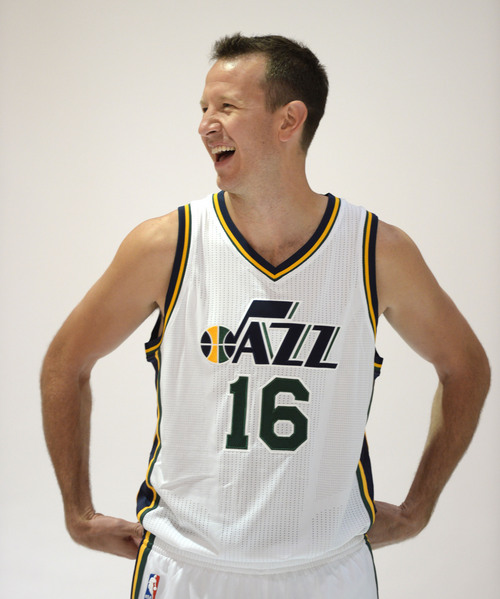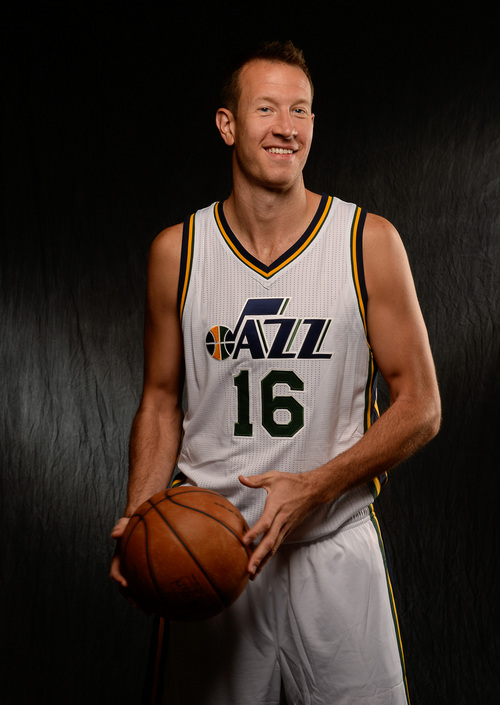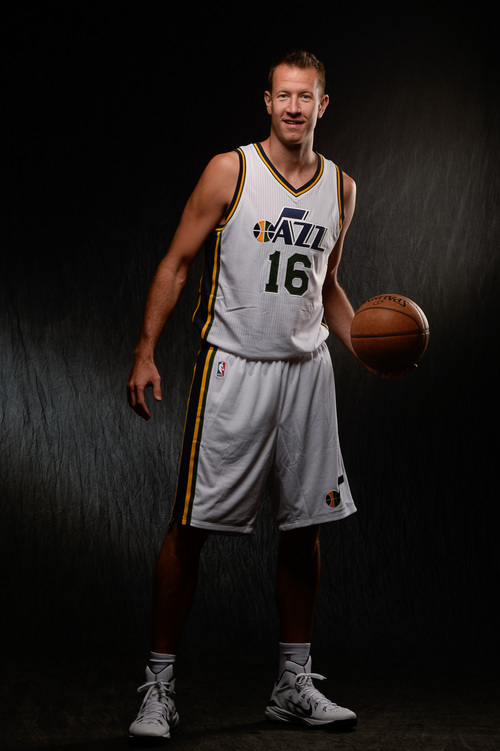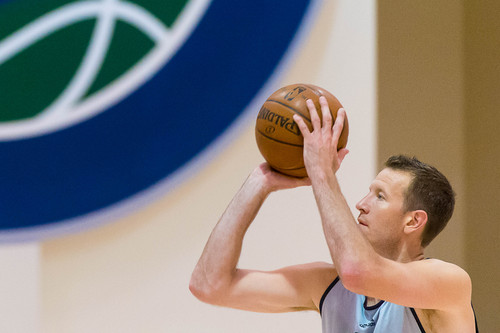This is an archived article that was published on sltrib.com in 2014, and information in the article may be outdated. It is provided only for personal research purposes and may not be reprinted.
It was a sequence that looks to occur repeatedly over the next six months.
During Sunday's scrimmage portion of practice, Alec Burks pushed the ball into the frontcourt. His path to the basket deterred, the Utah Jazz shooting guard took a pick from Steve Novak. Two defenders then converged on Burks, forgetting about the best shooter on the floor. Novak relocated to the 3-point line, took a pass and calmly knocked home a jumper.
Money.
Novak may not be the biggest Jazz player. He's certainly not the most athletic, and he won't receive the most minutes. But — at the same time — he could be one of the more important players on Quin Snyder's new roster.
"He's the best shooter on the team," Derrick Favors says. "Everyone know's he's the best shooter on the team, and somehow he keeps getting open. It's like, how do you leave Steve Novak open?"
This is what we know: The 6-foot-10 forward is the definition of a specialist. He does little, other than make jumpers from the perimeter. He's an NBA veteran, had to grind his way into the league and is the only member of the team over the age of 30. He's witty, has a touch of sarcasm and likes to joke with teammates and media alike.
His shooting is what makes him so enticing to Snyder's system. Novak is — percentage wise — one of the best to ever do it, cracking the top-10 career list in that category. As a power forward, Novak stretches the floor and provides spacing with his very presence in the offense. With Snyder valuing that aspect so much, one can't bet against him getting minutes, maybe even in crunch time.
"Camp has been great for me so far," Novak said. "I think camp has gone as expected. We hit the ground running with a lot of the stuff, and that's helped. I think we're further along than we thought we'd be. We have a long way to go, but we're ahead of schedule."
On a team lacking experience, Novak also has a chance to make an impact in the locker room and off the floor. The Jazz are the seventh team of his career, as he's played with the likes of Tracy McGrady, Tim Duncan, Carmelo Anthony and, most recently, Demar DeRozen.
He's been in similar systems to the one Snyder is running. He's the one person who has the chance to replace the graybeard effect lost with the departures of Richard Jefferson and Marvin Williams.
"When he's out there, he creates so much space for us," Snyder said. "That's really important for us because we have some guys who can get to the rim. We want the ball to break the paint on every possession, so if there's one fewer man in the lane, it's a good thing for us."
Snyder said Novak will play most of his time at the crowded power forward position. But Novak has played small forward during times in the past, and could do so again this season, even with the lack of a creative dribble.
Over the summer, Jazz General Manager Dennis Lindsey stressed that he wanted more shooting in more spots on the floor. That's a big reason he made the trade for Novak. The former Marquette star has never averaged more than 8.8 points per game. He's never averaged as many as two rebounds per game, and he's started six times in 414 career games.
Many of those trends will continue with the Jazz. There are times he could be a deep reserve. He won't be called on to defend, rebound, or make plays.
But his importance to Utah can't be overstated. Every team needs a role player. The Jazz need Novak to perfect his role as a knockdown shooter.
Twitter: @tjonessltrib —
Steve Novak file
• Played a career-high 20.3 minutes per game two seasons ago for the New York Knicks
• Has played for seven NBA franchises
• Played collegiately at Marquette
• Is expected to play a backup role at two positions for the Jazz
• Was traded for Diante Garrett this past summer —
Jazz scrimmage
P at EnergySolutions Arena, free admission
• Monday, 6:30 p.m.









